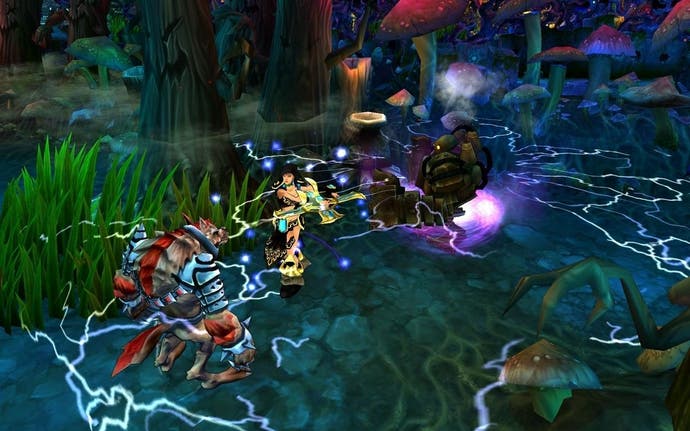Saturday Soapbox: No Consolation
As big publishers struggle to come to terms with some next-gen concepts, here's hoping Sony and Microsoft are mindful of the competition.
A couple of weeks back, Ian Livingstone stated that "with the new Xbox, you supposedly have to have an internet connection, and the discs are watermarked, whereby once played on one console it won't play on another. So I think the generation after that will be digital-only." That's a hell of a lot of supposition, born out of half-sourced rumours and general speculation over the past few weeks by both game developers and the games media.
It's born out of fear, but the problem is it's not an irrational one. Microsoft has hardly been the most considerate of platform owners, consistently throwing up an increasing amount of obfuscating and overbearing ads on the Xbox dashboard, not to mention already charging you a handsome sum just to play your console online. Why wouldn't it necessitate an internet connection just so you can play on your new console? It certainly benefits them. In theory, it prevents second hand sales, and makes the life of a pirate very difficult indeed.
Except we don't have to rely on theory. This week we've seen Sim City stumble as its servers crumble under huge demand, a problem EA's still in the process of addressing. Ubisoft has been through this all before - in 2010, it tried something along similar lines with its PC games, with less than satisfactory results. In September of 2012, they scrapped the program entirely, moving back to merely requiring an online activation of the game.
Ubisoft did this because the online requirement didn't work. Pirates still pirated the game, and the only people inconvenienced were the people who'd actually paid for the game. Whenever their servers went down, the players, regardless of how reliable or powerful an internet line they had, would be shut out of their games.

This has been an eight year console generation, twice the length of the previous, and it's done a lot of things to a lot of aspects of the industry. Of all of those, the one that should logically have been the least affected has undergone the largest change. In the time since the launch of the 360, we've seen the PC undergo the rise of Steam, the prevalence of free-to-play, and numerous attempts by publishers and developers to iterate, invent, control and empower players, with various degrees of success. You have failures like Ubisoft's, and successes like Valve's, and you have to wonder how much attention Microsoft and Sony are paying.
It was during the PS4 conference that the difference was most felt. The games, while certainly beautiful, weren't the cosmic leap that we've come to expect from a new console generation. And that's because the graphics hardware has undergone a double compression; firstly because there has been no huge push by developers for bigger and better due to being shackled to the archaic hardware of PS3 and Xbox 360, but also because while the shift from 100 polygons to 1000 is massive, going from 1000 to 10,000 isn't nearly so noticeable. As David Cage so aptly illustrated during the conference, we're at 30,000 with Beyond, but the difference between that and Heavy Rain is nothing compared to Heavy Rain and Fahrenheit.
So instead of chasing the ever dwindling tail of graphical improvement, the PC has been charging off in other directions, and thriving in them. With the likes of League of Legends and Dota 2, you've got not only some of the most popular games on the planet (even including Call of Duty), but also a burgeoning eSports scene, something that the consoles have always struggled with. You have people like Dean Hall and Dan Pinchbeck experimenting with new ideas, offering them for free before taking them away and iterating, expanding, and enhancing their games into something people are happy to pay for, in Day Z and Dear Esther.
There are just as many tales of failure as there are of success, like Zynga imploding due to their short-sightedness, or the attempts by EA to jump on the free-to-play wagon with the disaster of Battlefield Heroes, not to mention the issues with an always-online Sim City.
One of the biggest and brightest developments has come from the players themselves, with the sudden resurgence of modding thanks to the Steam Workshop. It's kept Skyrim sitting high in the most played lists, as well as vastly enhancing the likes of Scribblenauts Unlimited and Civilisation 5 by allowing players to easily make and share their own content. And what Valve has done with Dota 2 and Team Fortress 2, enabling creators to profit through the in-game stores, has been nothing short of genius. All of this is not to say that Sony and Microsoft have been working with blinkers on this whole time, but it's hard not to get frustrated when you start seeing 'always online' bandied around the next generation. It feels like just one symptom of a continued effort to insist on ignoring anything without a controller, and maintaining a vice-like grip over anything and everything they can.
Sony is at least making forward steps. The presence of Jon Blow at the PS4 announcement was encouraging to say the least, especially when it became apparent that he's self-publishing The Witness on the console. There's also Sony's willingness to relinquish a little control in the name of developer friendliness, as happened both with Portal 2 and Dust 514.

If both the PlayStation and Xbox's positions in the living room were as secure as Sony and Microsoft might like to think, I doubt much of this would be a problem. But that's simply not the case anymore. OnLive might have failed, but it's just the vanguard of cloud gaming, and as the broadband infrastructure improves, it's only going to come back, and be increasingly threatening. There's also Valve's Piston, letting the PC spill off the monitor and onto the TV. With the wealth of games available on Steam, that's a genuine threat, especially when they often prettier and cheaper than their console counterparts.
This isn't supposed to be heralding a PC master race or anything so trite. Instead it's about the fact that console cycles are getting longer, and that means fewer opportunities to implement hardware based features. If Microsoft do as the rumours suggest, and require the next Xbox to be always online, they're either going to have to grin and bear it for anywhere up to a decade, or betray all their early adopters and release a requirement-free version of the box at a later date. Both would be incredibly costly mistakes.
Both companies, along with Nintendo, are finding themselves in an increasingly awkward position of being hardware provider and gatekeeper to their prospective consoles, but they're in an increasingly broadening market where they're seen as more of a hindrance than a seal of quality. The rise of indie gaming, the continued surge of free to play, and the constantly redefined method of both distribution and payment are all going to become more of a factor in gaming, rather than less.
And that means the console that prevails is not going to be the one with the prettiest graphics, or even the best games. Instead it will be the one most willing to adapt, and get out of the way of the directions that games are going. They need to be more of a maître d welcoming new games and experiences, making sure there's the minimum of obstructions between player and game, and less of a surly guard, desperately asserting their control and will over each and every corner and space that they can.

